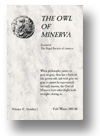|
|
|
1.
|
The Owl of Minerva:
Volume >
37 >
Issue: 1
Peter Hodgson
Hegel and Christian Theology:
Author's Summary
abstract |
view |
rights & permissions
| cited by
The contents of the book are briefly summarized and the themes of the concluding chapter elaborated. On the basis of Hegel’s speculative reconstructionof Christian theology in the Lectures on the Philosophy of Religion, the author argues for a theology of the Spirit that focuses on wholeness, narrative, Christ, community, and pluralism.
|
|
|
|
|
|
|
2.
|
The Owl of Minerva:
Volume >
37 >
Issue: 1
Cyril O'Regan
Philosophy of Religion in the Context of Hegel’s Philosophy:
Challenges and Prospects
abstract |
view |
rights & permissions
| cited by
This paper understands Hodgson’s Hegel and Christian Theology not only to represent the definitive expression of a distinguished Hegel scholar’s theological interpretation, but also to mark a threshold between where Hegel studies have been on the topic of the relation between religion and philosophy in Hegel’s thought and where they are going. On the threshold, Hodgson’s text faces three essential challenges with respect to its bona fides. The first challenge is whether, even if the privileged status of the Lectures on the Philosophy of Religion is granted, anything like consensus has been achieved concerning the importance of narrative and Trinity, on the one hand, and its claim to truth, on the other. The second challenge concerns method, and more specifically whether the teleological model deployed by Hodgson to underwrite the importance of the Lectures is sufficiently reflective to resist the rising authority of archeological accounts which privilege Hegel’s Phenomenology and pre-Phenomenology writings. The third challenge concerns the stability of Hodgson’s interpretation which tends to mediate between the religious and the political, on the one hand, and the non-logical and the logical, on the other. This is by far the most serious concern since it pertains to Hodgson’s act of synthesis. Here it is open to question whether Hodgson has succeeded here anymore than Fackenheim a generation earlier.
|
|
|
|
|
|
|
3.
|
The Owl of Minerva:
Volume >
37 >
Issue: 1
Robert R. Williams
Beyond Tradition and Modernity:
Hodgson’s Hegel and Christian Theology
abstract |
view |
rights & permissions
| cited by
Although Hegel has been rediscovered frequently, few have focused on Hegel’s speculative theology. Since Hegel criticizes traditional theology, it is widely assumed that he must be an atheist. But Hegel rejects the alternatives of a fossilized orthodoxy and a post-religious secularity. Hegel’s speculative philosophy has profound significance for Christian theological reconstruction. This essay focuses on Hegel’s philosophy of religion as a philosophical theology in the post-Kantian, post-Enlightenment context. Hegel rejects philosophies of finitude as nihilistic. Second, it examines how Hegel’s attempt to provide a logical map of world religions demonstrates the impossibility of such a logical mapping. Third, it concludes with an examination of eschatology: Hegel criticizes the dualist eschatology of religious representation because it undermines the actuality of reconciliation. The eschatology of the concept can only be taken up in the context of Hegel’s views concerning tragedy and the death of God. The suffering God excludes any triumphalist realized eschatology or end of history culmination.
|
|
|
|
|
|
|
4.
|
The Owl of Minerva:
Volume >
37 >
Issue: 1
Stephen Crites
Hodgson’s Choice
abstract |
view |
rights & permissions
| cited by
This review praises Hodgson’s study for exhibiting the experimental openness of Hegel’s thinking: far from being part of a closed system, Hegel’s philosophy of religion is a work in progress. But the review criticizes the final chapter of the study for hedging this openness, for narrowing Hegel’s contemporary legacy to a few currently fashionable gestures.
|
|
|
|
|
|
|
5.
|
The Owl of Minerva:
Volume >
37 >
Issue: 1
Peter C. Hodgson
Hegel:
Theologian of Freedom
abstract |
view |
rights & permissions
| cited by
In response to O’Regan I defend the claims that Hegel is serious about theology, that this seriousness is most fully evident in the Lectures on the Philosophy of Religion, that Hegel is an “open” thinker, and that pluralism is an implication of his way of thinking whereas radical relativism is not. I note that Williams supports the central theses of my book but believes that I have not appreciated the extent to which for Hegel eschatology is realized in the spiritual community. I argue that for Hegel eschatology cannot be fully realized because of his acute awareness of the presence of the tragic in history, and that therefore his claims on behalf of the consummateness of the Christian religion must be modified. Crites appreciates the emphasis I place on the experimental character of Hegel’s thinking, but believes that this quality is abandoned in the conclusion to my own work where I seem to embrace various postmodern freedom movements. I explain that in my view (and I believe in Hegel’s) God is the ultimate agent of freedom, not humanity, and that God’s freedom transcends and critiques all dogmatisms, includingthose of postmodernity.
|
|
|
|
|
|
|
6.
|
The Owl of Minerva:
Volume >
37 >
Issue: 1
New Books
view |
rights & permissions
| cited by
|
|
|
|
|
|
|
7.
|
The Owl of Minerva:
Volume >
37 >
Issue: 1
2006 Meeting of The Hegel Society of America
view |
rights & permissions
| cited by
|
|
|
|
|
|
|
8.
|
The Owl of Minerva:
Volume >
37 >
Issue: 1
Information for Contributors and Users
view |
rights & permissions
| cited by
|
|
|
|
